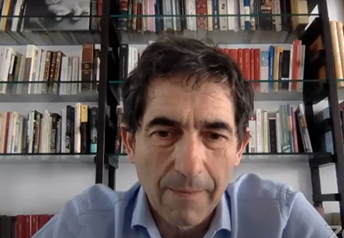On 18 June 2020, we presented the second issue of the journal SEVENTEEN, created to contribute to the achievement of the 2030 Agenda from science, research and knowledge dissemination. This second issue presents the difficulties involved in working in partnership, but also the opportunities it represents.
With the support of the Global Cooperation and Governance Community of El Día Después, experts in economics, climate change, sustainable development, multi-stakeholder partnerships, humanitarian aid and communication reflected and presented a series of examples on the need for partnerships at all levels to address the challenges of today's world, in relation to Sustainable Development Goal 17 of the 2030 Agenda. Examples of cases of successful collaboration between business, financial services and banking for cash transfers as a new modality of humanitarian action; a multi-stakeholder partnership to develop innovative energy access solutions in refugee camps in Ethiopia, or programmes for the creation of open innovation platforms for job creation in India, Peru and Mozambique.
The issue was presented by Carlos Mataix, director of itdUPM and Revista Diecisiete, so called because "SDG 17 is perhaps the most important because it speaks of the need for partnerships, of understanding innovation and the change of trajectory that we need as a joint effort".
In the words of Gorka Espiau, director of the Agirre Lehendakaria Center and academic editor of this monograph. "No one has all the knowledge necessary to tackle challenges as complex as the climate crisis or inequality, let alone global health emergencies such as the one we are experiencing: we must tackle new strategies of collective intelligence. A return to normalcy is not only unlikely but also undesirable, given the growing societal challenges such as lack of affordable housing, unemployment, biodiversity loss and pollution - chronic and interrelated crises that require a partnership approach.
The discussion between the authors of the articles was moderated by Leyre Madariaga, Director of External Relations of the Basque Government, who stressed in her introduction the need to review the concept of alliances, given that "no single actor can rise to the immeasurable challenges we face".
Leda Stott, expert in Multi-Stakeholder Partnerships, Mónica Oviedo, Head of Sustainability at Iberdrola, Fernando Mudarra, Director General of Ayuda en Acción, Itziar Moreno, from the Agirre Lehendakaria Center and María Jimena Peroni, humanitarian aid specialist at CashCap, debated this idea. They all agreed that the 2030 Agenda is the key to emerging from this crisis and on the need to promote partnerships that focus on inclusion and transformation. It is necessary to take into account not only the traditional dimensions of sustainability: social, economic and environmental, but also aspects that have been little analysed until now, such as communication and its role in this transformative process.
The second part of the debate included the participation of José Gabriel Martín, director of the Acciona Foundation and representative of the Alianza Shire, Esperanza Caro, director general of Sustainable Development, Financing and External Action at Seville City Council and member of the Community of Cities of El Día Después, and Virginia Rodríguez, Head of Advocacy at ISGlobal in Madrid and facilitator of the Community of Cooperation and Global Governance of El Día Después, who detailed different examples of multi-stakeholder alliances that are being implemented in different areas. All these innovative experiences demonstrate the added value of alliances in the search for solutions to large-scale problems.
To close the session, Carlos Mataix wanted to recall that "we are not talking about alliances on a whim. We are doing so because it is essential to change our trajectory, which is not possible without a new model of coexistence. There is in fact a sense of urgency that contrasts with the other feeling that we still have a lot to learn. We have to learn from action and take risks collectively, because there is no greater risk than continuing to do things as we have been doing".
THE JOURNAL SEVENTEEN
The journal SEVENTEEN (revista DIECISIETE) was born in 2019 from a collaboration between itdUPM and Acción contra el Hambre, with the vocation of contributing to the achievement of the 2030 Agenda from science, research and the dissemination of knowledge. At a time that requires new models of alliances and radical collaborations, it is more necessary than ever to promote interdisciplinary studies and research to interpret and promote the profound transformations required to achieve the SDGs.
This conversation in the Agora of El Día Después is a new open forum of the thematic community on Cooperation and Global Governance, in which experts and organisations from public administration, multilateral organisations, development NGOs and private companies participate with the aim of influencing public policy on cooperation and strengthening global governance.


